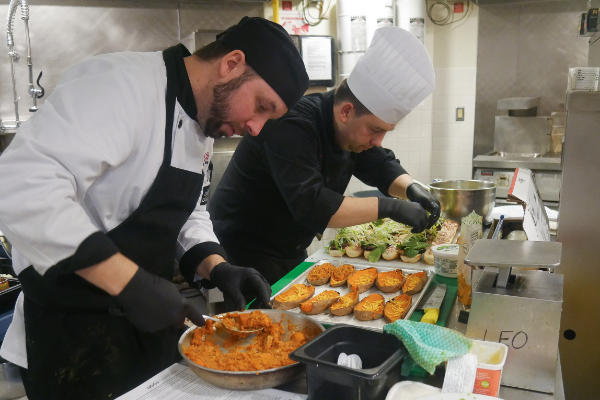Championing sustainability on campus
June 7, 2019
Share

Each year, Queen’s Hospitality Services works to reduce waste and make its carbon footprint smaller. Sustainable Kingston, a non-profit organization created by the city, has recognized these efforts by naming Hospitality Services the 2019 Organizational Sustainability Champion.
Hospitality Services operates the food services on campus, and it runs a range of initiatives to lessen its environmental impact and promote food security. One of its ongoing goals has been to significantly cut down the number of single-use items on campus. In September 2018, for instance, all in-house retail brands operated by Hospitality Services switched entirely to paper straws, which has diverted an estimated 280,000 plastic straws from landfills over the past academic year.
Through the ECO Beverage Card incentive program, Hospitality Services has also reduced the consumption of single-use cups on campus by 10 per cent. Launched in 2018, the ECO Beverage Card rewards customers for using reusable mugs by granting one free coffee or tea when they collect 7 stamps on their card.
Most recently, Hospitality Services has prevented the waste of approximately 100,000 single-serving plastic cups simply by adopting bulk sauce pumps, which customers use to apply condiments directly to their food.
Through its We Love Local initiative, Hospitality Services pairs its environmental mission with investment in the regional economy. It works with Deodato’s, a local produce wholesaler, to purchase in-season fruit from over 27 farmers in Ontario and Quebec. Buying food this way not only supports area farms, it is environmentally friendly, as it does not rely on the large amounts of fossil fuels that are required to transport produce internationally.
Since early 2018 Hospitality Services have facilitated the donation of over 1,700 meals at campus dining halls through Swipe It Forward. This program enables students to give their unused meal-plan swipes to peers who are facing food insecurity, simultaneously diverting waste and distributing food to those who need it. All unused food on campus is also donated daily to local charities.
Hospitality Services is also working to lessen its carbon footprint by expanding its offerings of plant-based foods, which are more environmentally friendly than meals centred on meat. Over reading week, for example, nineteen chefs at Queen’s took part in Forward Food, a two-day culinary training program focused on preparing plant-based food. Rustic Roots, which serves only vegan dishes, also opened this year in the Ban Righ dining hall.
“By paying attention to every detail, we’re working to eliminate as much waste as we can and to constantly reduce our carbon footprint,” says Jennifer Pete, Associate Director Housing and Ancillary Services. “At Hospitality Services, we see ourselves as an integral part of the university’s efforts to promote sustainability. I think we’re showing that promoting food security and protecting the environment go hand in hand. And we’re very honored that Sustainable Kingston has chosen us as the 2019 Organizational Sustainability Champion.”
The initiatives run by Hospitality Services are a part of Queen’s broader efforts to create a culture of sustainability. Ongoing initiatives, such as the 2019 Commuter Challenge, the Transpass Program, and Dropbike, for example, have encouraged members of the Queen’s community to use sustainable methods of transportation. And recent infrastructure developments, such as the District Energy Project, have increased energy efficiency and reduced emissions. All of these different initiatives are helping Queen’s fulfill its Climate Action Plan. Signed by Principal Woolf in 2016, this plan sets the goal for the university to become carbon neutral by 2040.